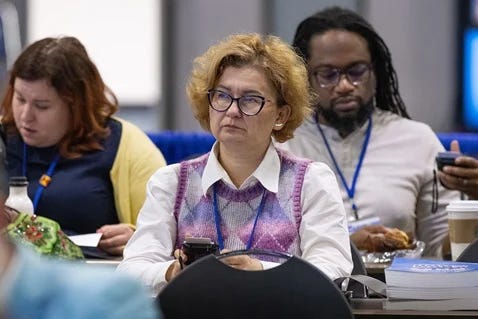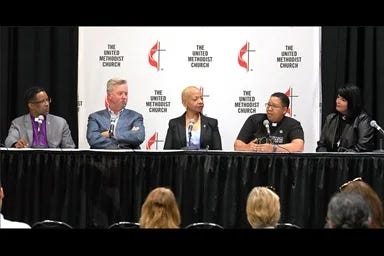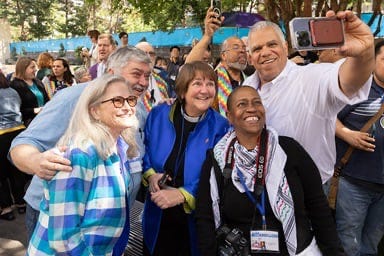The United Methodist Church General Conference
Has there been another denominational conference in recent decades that has been this impactful?
Over the two weeks running from April 22nd to May 3rd, the United Methodist Church held its General Conference in Charlotte, North Carolina. Delegates from around the world gathered to conduct the business of the denomination. As a sociologist of religion, I wish I could have been there. But I am grateful for the detailed reporting from The Tennessean’s Liam Adams, Religion News Service’s Yonat Shimron, and my pastor Jasper Peters to keep me informed as to what was happening.
The last general conference was held in 2016 in Portland, Oregon. That conference, like every one since 1972, struggled on how to deal with the question of LGTBQ+ inclusion. A special conference was called in 2019 in St. Louis just to deal with that challenging topic.
In the 2019 conference, what is known as “the traditional plan” was adopted by the majority of delegates through a combination of conservatives in the US and delegates from Africa and South America. It kept in place prior wording on sexuality, marriage, and discipline for clergy who defied the Book of Discipline.
In early 2020, a group gathered from a variety of positions on the topic. They agreed to a “Protocol of Reconciliation & Grace” that provided a path for separation of some groups once the protocol was adopted by the majority of annual conferences and then adoption by the 2020 General Conference.
Then Covid happened. The 2020 General Conference was cancelled. In 2022, conservatives tired of waiting created the Global Methodist Church. By the end of 2023, a quarter of UMC churches had left the denomination (disproprotionately in the South). Not all joined the GMC as some became independent or joined other small religious bodies.
So the 2024 General Conference in Charlotte was sociologically interesting. How does a church body process five (or fifty-two) years of crisis, disruption, and acrimony? What does it mean to be the Body of Christ committed to “open hearts, open minds, and open doors”? How does a group reposition itself in ministry to the current age while maintaining its Wesleyan theological commitments?
It seems to me that part of the answer is for the 2014 General Conference to be the first conference of a forward thinking UMC as opposed to rehashing old battles. There’s something theologically profound in “reaching for the goal set before us”.
Obviously, the big change that occurred in Charlotte was the removal of the language claiming that homosexuality was incompatible with a mature faith. This isn’t an acquiescence of the broader culture but rather a recognition of the faithful gay Christians who have been part of the fellowship for decades. The barriers to LGBTQ+ folks serving as clergy and bishops were removed. Marriage was affirmed as being between a man and woman or two consenting adults of the same sex.1 Clergy are permitted — but not required — to perform same-sex weddings
Another huge change was the passage of regionalization proposals. Where in the past, the North American church was seen as central and the Book of Discipline applied worldwide, the UMC will now be divided into pretty autonomous regions with control over cultural standards as appropriate to the region. This structural change affirms the importance of a world-wide denomination without mandating that everybody be the same.2
Deacons were consecrated at the conference. Legislation passed that now allows them to preside over sacraments, which will be helpful given the number of bivocational and part-time ministers. A fellow church member was one of those confirmed.
The UMC entered into full communion with the Episcopal Church, something that has been on hold since the 2022 split.
There was also a major reduction in the general church budget. Partly this is a result of loss of members from disaffiliation. But it is also a way for Methodists to be more ministry centered and less bureaucratic, something that has been in the works for some time.
I’m sure there are major details I’ve glossed over and other pieces of business I’ve left out all together.
But I’m still staying with my overall judgment about what’s ahead for the UMC. The General Conference in Charlotte sets the stage for vital ministry in the future. That’s not to say that everyone in every local UMC congregation will like the changes that were made. But if they keep their focus on the future of ministry as opposed to worrying about the past conflicts, there’s a very good chance that the United Methodist Church will be stronger in the next decade because of what happened in Charlotte.
Prohibitions against child marriage and polyandry remain.
In the late 1980s, I proposed that the Church of the Nazarene adopt a similar model to create regional structures that dealt with both governance and cultural adaptation. I guess I was just ahead of my time.







The United Methodist Church, what’s left of it, is dying-literally. It may take a long time to die. Or some remarkable form of spiritual renewal or revitalization could happen. But slow and steady decline is probably the future.
This is a very sad commentary on the state of the UMC. Just throwing scripture out the window will NEVER be beneficial for the church. God is not mocked: your trite sayings might be cute or inspiring to some, but they are far from the truth of God’s word. It appears that you have set your sights for the trash heap that is today’s culture.